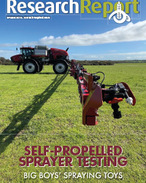This article is 6 years old. Images might not display.
A zoonotic infection is a disease spread between animals and people and zoonotic diseases can be caused by viruses, bacteria, parasites, and fungi.
According to Agriculture Victoria, during lambing season there is a risk of zoonotic infection via infectious abortions in ewes.
Agriculture Victoria district veterinary officer, Dr Elle Moyle, said that during the 2016-18 period 35 cases of abortion in sheep and cattle were confirmed as being due to pathogens with zoonotic potential including: campylobacter, listeria, brucella, leptospira and toxoplasma.
"Without proper precautions these pathogens can spread," Dr Moyle said.
"This can easily be avoided by washing your hands before and after contact with infected animals and using gloves, a P2 mask and eye protection when handling infected animals."
Dr Moyle said the transmission can occur through contact with infected animals and infected animal tissues, handling of placental tissue, faeco-oral and the ingestion of unpasteurised milk.
Those most at risk of zoonotic infection are farmers, abattoir workers, meat inspectors, veterinarians, livestock carriers, animal handlers, the immunocompromised and elderly, young and pregnant people.
Potential symptoms of zoonoses in humans can include, fever, headaches, muscle pain, sweats and diarrhoea and vomiting. People who are unwell should seek medical attention.
Precautions to protect people include:
* Using personal protection equipment - PPE (gloves, P2 mask, eye protection, coveralls)
* Washing hands before and after contact
* Not opening an animal's uterus unless all of the recommended PPE is being used
* Q fever vaccination
* Using disinfectant
Precautions to protect the sheep flock include:
* Vaccinating
* Isolating aborting ewes
* Cleaning up and appropriately disposing of foetal material
* Not using aborting ewes to mother orphan lambs
As always, prevention is better than cure. For further information please contact your local veterinarian or Agriculture Victoria animal health staff on 136 186.























